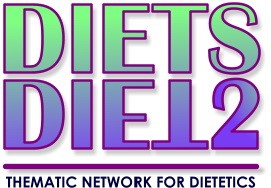These include standards for academic learning, competence (both at point of qualification and advanced) and for practice placement learning. The standards have been translated into many European languages.
Please see Our work/Standards

DIETS is an acronym for:
Dietitians
Improving the
Education and
Training
Standards for dietitians across Europe.
Go to DIETS Deliverables list.
What is a Thematic Network?
Thematic Networks are one of the main innovations of the Socrates-Erasmus programme. They were created to deal with forward-looking, strategic reflection on the scientific, educational and institutional issues in the main fields of higher education. Generally speaking, a Thematic Network is a co-operation between departments of higher education institutions and other partners (e.g. academic organisations or professional bodies). Normally, all countries participating in the Socrates-Erasmus programmes (EU, EFTA and Candidate Countries) should be represented in a Thematic Network. The main aim of the programme is to enhance quality and to define and develop a European dimension within a given academic discipline or study area. Alternatively, it can take up a topic of an inter- or multidisciplinary nature, or other matters of common interest, such as university management or quality assurance. Co-operation within Thematic Networks is expected to lead to outcomes which will have a lasting and widespread impact on universities across Europe in the field concerned.
All the Thematic Networks have taken European integration on board and have had a very pronounced European dimension. In that sense, European co-operation has been envisaged at two levels: Firstly, as a policy issue, where higher education has been called upon to contribute to the cultural, economic and technical construction of the Union. Secondly, Thematic Networks have been a means in itself to stimulate and, where necessary, adapt higher education, improving its quality and effectiveness.
Objectives
The main aim of Thematic Networks (TN) is to enhance quality and to define and develop a European dimension within a given academic discipline or study area, or as regards a topic of an interdisciplinary/multidisciplinary nature, or in other matters of common interest (such as university management, quality assurance etc.). This is achieved by means of cooperation between universities, university faculties or departments. Such cooperation should also involve academic associations, learned societies, professional bodies, other partners of socio-economic importance in the public or private sector and, where appropriate, student organisations. Cooperation within Thematic Networks is expected to lead to outcomes which will have a lasting and widespread impact on universities across Europe in the field concerned.
http://eacea.ec.europa.eu/static/en/overview/ThemNetwks_overview.htm


